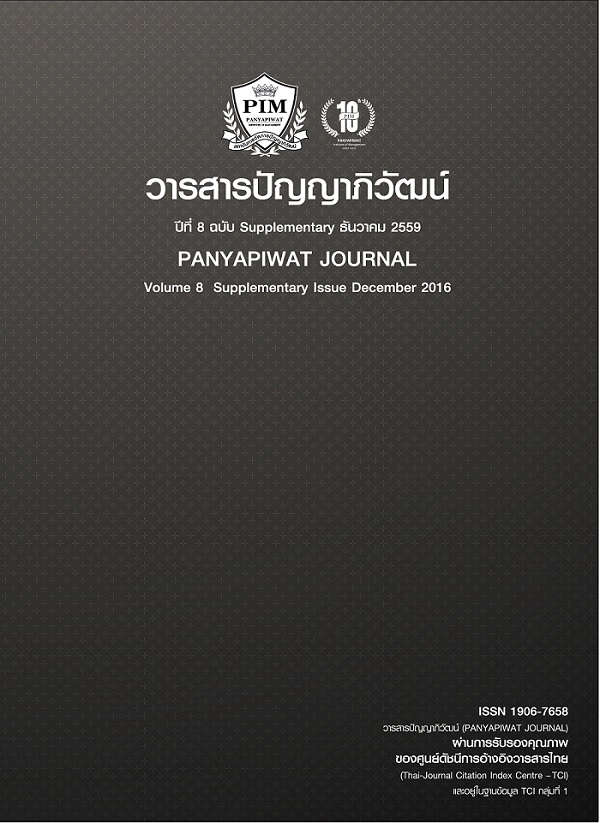商业模式创新的特点对创业型企业绩效的影响研究 ——以中国新三板挂牌企业为例
Main Article Content
บทคัดย่อ
通过定量分析,本研究在互联网和大数据发展背景下,选择中国新三板创业型企业为样本,以问卷调查和企业年报数据相结合,通过多元回归分析方法,对创业型企业商业模式创新与企业绩效的关系进行实证检验。结果表明:商业模式创新能提升创业型企业绩效。并提出了积极实施商业模式创新,拓宽市场占有率,完善企业盈利模式,是创业型企业能够持续稳定发展的建议。
This research, in the context of Internet and development of big data, is sampled on Chinese NEEQ-listed enterprises, and carries out empirical test on the relation between the business model innovation of entrepreneurial enterprises and enterprise performance by combining questionnaire and annual statements and employing the multivariate regression analysis. The results indicates that innovation of business model contributes to the performance of entrepreneurial enterprises. The research proposes that the sustained and stable development of entrepreneurial enterprises depends on innovating business model, expanding market share and improving business profit model.
Article Details
“ข้าพเจ้าและผู้เขียนร่วม (ถ้ามี) ขอรับรองว่า บทความที่เสนอมานี้ยังไม่เคยได้รับการตีพิมพ์และไม่ได้อยู่ระหว่างกระบวนการพิจารณาลงตีพิมพ์ในวารสารหรือแหล่งเผยแพร่อื่นใด ข้าพเจ้าและผู้เขียนร่วมยอมรับหลักเกณฑ์การพิจารณาต้นฉบับ ทั้งยินยอมให้กองบรรณาธิการมีสิทธิ์พิจารณาและตรวจแก้ต้นฉบับได้ตามที่เห็นสมควร พร้อมนี้ขอมอบลิขสิทธิ์บทความที่ได้รับการตีพิมพ์ให้แก่สถาบันการจัดการปัญญาภิวัฒน์หากมีการฟ้องร้องเรื่องการละเมิดลิขสิทธิ์เกี่ยวกับภาพ กราฟ ข้อความส่วนใดส่วนหนึ่งและ/หรือข้อคิดเห็นที่ปรากฏในบทความข้าพเจ้าและผู้เขียนร่วมยินยอมรับผิดชอบแต่เพียงฝ่ายเดียว”
เอกสารอ้างอิง
Aspara, J. (2010). Business model innovation vs replication: Financial performance implications of strategic emphases. Journal of Strategic Marketing, 18(1), 39-56.
Chesbrough, H. W. & Rosenbloom, R. S. (2002). The role of the business model in capturing value from innovation: Evidence from Xerox Corporation’s technology spinoff companies.Industrial and Corporate Change, 11(3), 533-534.
Ding, Y. F. (2006). A Study on the Relation Between Entrepreneurial Organizational Learning and Entrepreneurial Performance. Doctoral Dissertation, Zhejiang University, 39-43. [in Chinese]
George, P. & Chapman, M. (2006). IBM’s global CEO report 2006: Business Model innovation matters.Strategy & Leadership, 34(5), 34-40.
Hamel, G. (2000). Leading the revolution.Boston: Harvard Business Scholl Press.He, X. G. & Shen, Y. (2008). The Growth of Entrepreneurial Enterprise: An Empirical Study Based on Entrepreneur Team Capital. Management World, (1), 82-95. [in Chinese]
Hovakimian A. & Kane, E. (2000). Effectiveness of capital regulation at U.S. commercial banks, 1985 to 1994. The Journal of Finance, 55(1), 451.
Liu, Y. (2008). Exploring the Approach to Business Model. Enterprise Vitality, (10), 38-39. [in Chinese]
Magretta, J. (2002). Why business models matter. Harvard Business Review, 80(5), 86-92.
Markides, C. & Sosa, L. (2013). Pioneering and first mover advantages: the importance of business models. Long Range Planning, 46(4-5), 325-334.
Meyer, A. D. (1991). What is Strategy’s Distinctive Competence?. Journal of Management, 17(4), 821-833.
Miller, D. & Breton-Miller, L. (2011). Governance, Social Identity and Entrepreneurial Orientation in Closely Held Public Companies. Entrepreneurship Theory and Practice, 35, 1051-1076.
Miller, D. (2001). The correlates of entrepreneurship in three types of firms. Management Science, 29(7), 770-791.
Osterwalder, A. & Pigneur, Y. (2005). Clarifying business models: Origins, present, and future of the conception. Communications of AIS, 15(5), 751-775.
Rappa, E. M. (2003). Diffusion of Innovations. New York: Free Press.
Ruekert, R. W. & Walker, O. C. (1985). The organization of marketing activities: a contingency theory of structure and performance. Journal of Marketing, 49, 13-25.
Schumpeter J. (1934). The theory of economic development: An inquiry into profits, capital, credit, interest, and the business cycle. Boston: Harvard University Press.
Shane, S. & Venkataraman, S. (2000). The promise of entrepreneurship as a field of research. Academy of Management Review, 25(1), 217-226
Stewart, D. W. & Zhao, Q. (2000). Internet marketing, business models, and public policy. Journal of Public Policy and Marketing, (3), 287-296.
Teece, D. J. (2010). Business Models, business strategy and innovation. Long Range Planning, 43(2/3), 17-194.
Thomas, H. & Pollock, T. (1999). From I-O Economics’ S-C-P Paradigm through Strategic Groups to Competence-based Competition: Reflections on the Puzzle of Competitive Strategy. British Journal of Management, 10(2), 127-140.
Timmers, P. (1998). Business models for electronic markets. Journal on Electronic Markets, 8(2), 3-8.
Venkatraman, N. (1986). Strategic orientation of business enterprises: The construct dimensionality, and measurement. Management Science, 35(8), 942-962.
Wang, S. Q. (2007). Entrepreneurial Competence and Study on Transformative Mechanism. Group Economics Research, (2), 106-107. [in Chinese]
Wang, W. Y. & Li, Q. W. (2005). A Study on Business Model in the Perspective of Entrepreneurial Theory. Foreign Economics and Management, (11), 32-40. [in Chinese]
Wang, X. D. & Dong, D. H. (2012). Discussions and Prospective Study on the Subject Attributes and Positioning of Business Model. Foreign Economics and Management, (3), 2-9. [in chinese]
Yuan, L. (2007). A review on the Theoretical Studies Abroad on Business Model. Foreign Economics and Management, 10(29), 17-25. [in Chinese]
Zhang, Y. L. (2010). Exploring the Status Quo of Entrepreneurial Studies and Its Improvement in the Process of Application. Foreign Economics and Management, 1(32), 1-7. [in Chinese]
Zott, C. & Amit, R. (2010). Business model design: an activity system perspective. Long Range planning, 43(2), 216-226.


